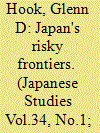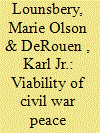| Srl | Item |
| 1 |
ID:
131331


|
|
|
|
|
| Publication |
2014.
|
| Summary/Abstract |
This article investigates Japan's current role in the Senkaku Islands. The government maintains administrative control of these tiny, uninhabited islands and rocks at the frontier of Japan, but both the governments of China and Taiwan dispute Japanese claims to sovereignty and claim sovereignty over the islands themselves. Whilst much of the extant literature examines these competing claims, this article instead explores the relationship between risk, sovereignty and governance at the frontiers of Japan. It seeks to demonstrate in particular how the governance of Japan's maritime frontiers reflects a broader process of the recalibration of risk by the Abe Shinz? government as part of ending the postwar regime. Its main purpose is twofold: first, to illuminate how the government carries out administrative control and governance of a remote, uninhabited territory when sovereignty is challenged and in dispute; and second, to elucidate how the government's recalibration of risk generates a range of costs for the Japanese market and society as a result of the deterioration of relations with China arising from the way risk is being recalibrated.
|
|
|
|
|
|
|
|
|
|
|
|
|
|
|
|
| 2 |
ID:
147530


|
|
|
|
|
| Summary/Abstract |
Civil war peace agreements are prone to collapse. While some research suggests that multiple layers of power-sharing provisions lead to more viable agreements, others have suggested that negotiated settlements are not only more likely to return to violence, but that those cases will be more deadly as a result. We suggest here that previous research has failed to address the various ways that peace agreements emerge and that this context is crucial in explaining peace agreement viability. In some situations, rebels are likely to earn those concessions through battlefield success. Governments may feel compelled to address underlying grievances in order to stop the bloodshed and ultimately maintain some political clout in the postwar regime. In other cases, however, governments may feel pressure to engage in discussions and to provide concessions by outside actors, whether in the form of diplomatic intervention, economic, or foreign military intervention. Hypotheses are tested on all civil war peace agreements identified by the UCDP Peace Agreement Data-set for 1975–2011. Findings from logit and hazard models suggest that agreements brought about in the aftermath of military intervention on behalf of rebels are more likely to endure while those earned on the battlefield (i.e., stronger rebels) do not. In addition, mediation enhances peace agreement viability, while interventions on behalf of governments tend to undermine it.
|
|
|
|
|
|
|
|
|
|
|
|
|
|
|
|